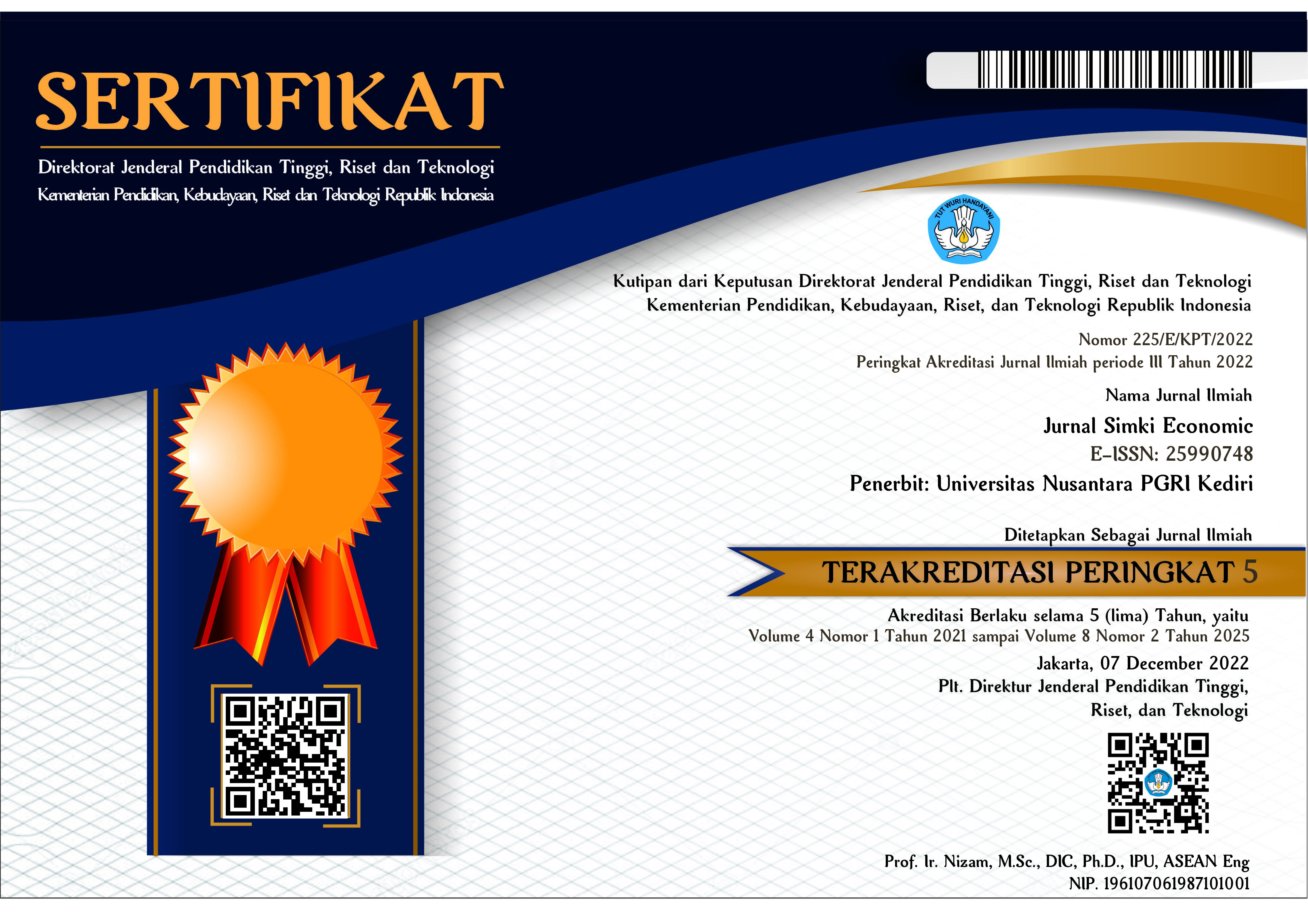Analisis Kepercayaan Pelanggan E-Commerce Berdasarkan Persepsi Pembeli
 Abstract views: 592
,
Abstract views: 592
,
 PDF (Bahasa Indonesia) downloads: 594
PDF (Bahasa Indonesia) downloads: 594
Abstract
E-commerce is a medium of online trading that will help the efficiency and productivity of buying and selling for business owners and consumers. Less physical presences both parties raised doubts on consumers to transact online. Therefore, trust is a key factor in transactions. Therefore, the trust in e-commerce needs to be addressed. An analysis is done by examine what factors can improve the Indonesian's trust in e-commerce. The research model is adapted from the selected previous research models which consisted of six hypotheses The study sampling method was purposive sampling technique. 102 main samples is obtained to be analyzed. Hypothesis test results stated that the website quality / application has a significant effect on customer trust. This means that factor that makes increase trust for online transactions is a good quality website of an online store. The quality of a good website including quality of information, ease of use, the actuality of the product, and the service quality on the website.
Downloads
References
Adi Ahdiat. (2022, October 11). jumlah UMKM di negara ASEAN. https://databoks.katadata.co.id/datapublish/2022/10/11/indonesia-punya-umkm-terbanyak-di-asean-bagaimana-daya-saingnya#:~:text=Laporan%20tersebut%20mencatat%20jumlah%20UMKM,sekitar%2065%2C46%20juta%20unit.
APJII. (2015). Profil Pengguna Internet Indonesia 2014 (S. Parlindungan Marius, Ed.; 1st ed.). Asosiasi Penyelenggara Jasa Internet Indonesia.
apjii. (2022). profil internet indonesia 2022.
Chang, K., Kuo, N., Hsu, C., & Cheng, Y. (2014). The Impact of Website Quality and Perceived Trust on Customer Purchase Intention in the Hotel Sector : Website Brand and Perceived Value as Moderators. International Journal of Innovation, Management and Technology, 5(4), 255–260. https://doi.org/10.7763/IJIMT.2014.V5.523
Cnn Indonesia. (2021, October 15). Kasus Penipuan Online Indoneisa. https://www.cnnindonesia.com/teknologi/20211015085350-185-708099/kominfo-catat-kasus-penipuan-online-terbanyak-jualan-online
Corbitt, B. J., Thanasankit, T., & Yi, H. (2003a). Trust and e-commerce: a study of consumer perceptions. Electronic Commerce Research and Applications, 2(3), 203–215. https://doi.org/10.1016/S1567-4223(03)00024-3
Corbitt, B. J., Thanasankit, T., & Yi, H. (2003b). Trust and e-commerce : A study of consumer perceptions. Electronic Commerce Research and Applications, 2(3), 203–215. https://doi.org/10.1016/S1567-4223(03)00024-3
Doney, P. M., & Cannon, J. P. (2018). An Examination of the Nature of Trust in Buyer–Seller Relationships. Https://Doi.Org/10.1177/002224299706100203, 61(2), 35–51. https://doi.org/10.1177/002224299706100203
Ghozali, I., & Latan, H. (2015). Partial Least Square:Konsep,Teknik,dan Aplikasi Menggunakan Program SmartPLS 3.0 (2nd ed.). UNDIP.
Gustavsson, M., & Johansson, A.-M. (2006). Consumer Trust in E-commerce (Issue December). kristiandstad university.
Jarvenpaa, S. L., Tractinsky, N., & Vitale, M. (2000). Consumer Trust in an Internet Store. Information Technology and Management, 45–71.
Jarvenpaa, S., & Tractinsky, N. (1999). Consumer trust in an internet store: a cross-cultural validation. Journal of Computer Mediated Communication, 5(2), 1–35.
Kini, A., & Choobineh, J. (n.d.). Trust in electronic commerce: definition and theoretical considerations. Proceedings of the 31st Annual Hawaii International Conference on System Sciences, 4, 51–61.
Li, R., Kim, J., & Park, J. (n.d.). The Effects Of Internet Shoppers ’ Trust On Their Purchasing Intention In China. J. Inf. Syst. Technol. Manag, 4(3), 269–286,.
Mamuaya, R. (2013). Effective Measure: Pengguna Internet Indonesia Belum Percaya E-Commerce. Dailysocial.Com. http://dailysocial.id/post/effective-measure-pengguna-internet-indonesia-belum-percaya-e-commerce
Mayer, R., Davis, J., & Schoorman, F. (1995). An integrative model of organizational trust. Academy of Management Review, 20(3), 709–734.
Murphy, G. B. (n.d.). Propensity to Trust, Purchase Experience, and Trusting Beliefs of Unfamiliar E-Commerce Ventures. J. Entrep, 6(2).
Prompongsatorn, C., Sakthong, N., Chanipoopirutana, S., & Combs, H. (n.d.). The Factors Influencing Consumer Trust of Internet Shopping in Thailand. In Proceeeding of ASBBS, 19(1), 736–745.
Sangadji, E. mamang, & sopiah. (2010). Metodologi Penelitian-Pendekatan Praktis dalam Penelitian. ANDI.
Saraswati, P., & Baridwan, Z. (2012). Penerimaan Sistem E-Commerce : Pengaruh Kepercayaan, Persepsi Manfaat Dan Persepsi Risiko. Univ. Brawijaya, 1–19,. https://jimfeb.ub.ac.id/index.php/jimfeb/article/view/277/225
Shankar, V., Urban, G., & Sultan, F. (2002). Online trust: a stakeholder perspective, concepts, implications, and future directions. Journal of Strategic Information Systems, 11(3–4), 325–344.
Siagian, H., & Cahyono, E. (2014). analisis website quality , trust dan loyalti pelanggan. Jurnal Manajemen Pemasaran, 8(2), 55–61.
Teo, T. S. H., & Liu, J. (2007a). Consumer trust in e-commerce in the United States, Singapore and China. Omega, 35(1), 22–38. https://doi.org/10.1016/j.omega.2005.02.001
Teo, T. S. H., & Liu, J. (2007b). Consumer trust in e-commerce in the United States, Singapore and China. Omega, 35(1), 22–38.
Turban, E., King, D., Lee, J., Liang, T.-P., & Turban, D. C. (2012). Electronic Commerce 2012 (7th ed.). Pearson Education.
Yousafzai, S. Y., Pallister, J. G., & Foxall, G. R. (2003). A proposed model of e-trust for electronic banking. Technovation, 23(11), 847–860. https://doi.org/10.1016/S0166-4972(03)00130-5
Copyright (c) 2023 Emha Diambang Ramadhany, Muhammad Qomarul Huda, I Dewa Made Yuda Mahendra

This work is licensed under a Creative Commons Attribution 4.0 International License.














